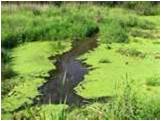 Cyanobacteria, commonly known as blue green algae or bacteria, are unlike most bacteria. It photosynthesizes like algae and plants, making its own food using water and energy from light, with a by-product of oxygen. They are one of the earliest life forms to evolve on earth. Most likely they are responsible for creating the oxygen atmosphere until the planet was conducive to life.
Cyanobacteria, commonly known as blue green algae or bacteria, are unlike most bacteria. It photosynthesizes like algae and plants, making its own food using water and energy from light, with a by-product of oxygen. They are one of the earliest life forms to evolve on earth. Most likely they are responsible for creating the oxygen atmosphere until the planet was conducive to life.
Cyanobacteria account for 20–30% of earth’s photosynthetic productivity. The bacteria have a phenomenal carbon-absorption rate, with each hectare soaking up one ton of CO2.
Director of a study being done at University of Queensland, Dr. Wendy Williams, believes that cyanobacteria can be farmed and used to rehabilitate soils. The bacteria can be found in almost any environment, from oceans to fresh water to bare rock to soil. Dr. Williams says they could be a boon to land owners in a carbon-trading economy.
References
Donaghey, Kathleen, October 30, 2011, Super Slime Cyanobacteria saviour of the Planet in War on Climate Change, http://www.couriermail.com.au/news/queensland/super-slime-saviour-of-the-planet/story-e6freoof-1226180541767
Cyanobacteria, August 2006, http://naturalaquariums.com/plantedtank/0608.html
Cyanobacteria , http://en.wikipedia.org/wiki/Cyanobacteria

Comments are closed.